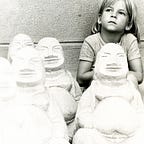Lose the attitude that you have to win
Oct 30
I’ve always loved Halloween in America. People send their kids to knock on people’s doors in the dark of night, and encourage them to accept candy from strangers! We actually, for once, laugh together at our fears.
We could use more laughter together right now, at the fear mongering in today’s politics.
We can point an accusing finger at Donald Trump, for the tone he has set as President. There are many unforgivable things Trump has done, motivated by self-interest. But perhaps the worst, for a leader, is that he has divided his own people. He has set this country against itself. We were already a mess, already prone to sectarianism. He has exploited those divisions and built figurative walls among us so high that we cannot even see each other well enough to argue meaningfully.
But before you enjoy that finger pointing too much, consider whether you’re also falling prey to the paradigm that Trump’s promoting. It’s the win/lose paradigm.
Paradigms are ways we habitually think about the world, and they often guide our actions unconsciously. While winning and losing may be events that make us happy or sad, a win/lose paradigm is about thinking about life primarily through the lens of winning and losing, winners and losers. You see interactions with people as contests in which you must come out better than the other person — even if just in your head. You have to have the thought that others think you are the “winner”. Because the alternative would diminish your self esteem. You’d be a loser!
I know this trap because I have fallen for it. And I know it because when I coach leaders and their teams I see how the paradigm lurks in the way they guard against revealing their feelings, for fear they will seem weak. In the process they fail to share real truths or seek help from each other. They stunt their growth as a team.
Win/lose is revealed in corridor conversations or boardroom politics. It’s revealed when we compare ourselves to others on social media and feel envy at their seemingly winning lives (“others are winning under Covid and I’m losing”). It’s even present in the ridiculous machismo of refusing to wear a mask in a pandemic (“I’m not going to let Covid beat me, I’m tougher than that.”). It’s revealed when Trump calls a genuine war hero a “loser” for being captured.
Think for a moment of all the ways in which you might have adopted win/lose as a paradigm. How is it active in how you are with others? Look for where you compare yourself to other people, or sense a little competitive threat.
And now turn your attention to a healing paradigm, one that will serve you far better in life, work, love and even competition. Call it the partnership paradigm.
When you adopt a partnership paradigm, you look at the world through a lens of joining with others to accomplish something together. You don’t see rivals, you see friends, teammates. You don’t see how to exploit someone’s weaknesses, you see how to make the most of their strengths. You don’t put on emotional armor, you share your burdens. You don’t transact, you relate.
One client of ours was anxious about an upcoming executive offsite. As she drove to the offsite, she had an epiphany provoked by one of our conversations. What if instead of thinking that she was walking into a lion’s den of senior rivals, she was instead going to visit her close friend, who lived near the location? She’d be excited to see them. She’d want to know how they really were. She’d want to go for walks with them. She’d want to solve problems with them.
With that frame of mind, she entered the offsite… And it became the best meeting she had ever had with her colleagues. Collegial, congenial, close. It turns out that it was the best meeting for that team, period.
I’m convinced how she showed up, with partnership, helped create that for everyone.
So, what might happen if you bring a partnership paradigm to your next feared encounter?
What might happen if there were more of a partnership paradigm in America?
What might happen if we have a President who thought that way?
Happy Halloween,
With love,
Tom
